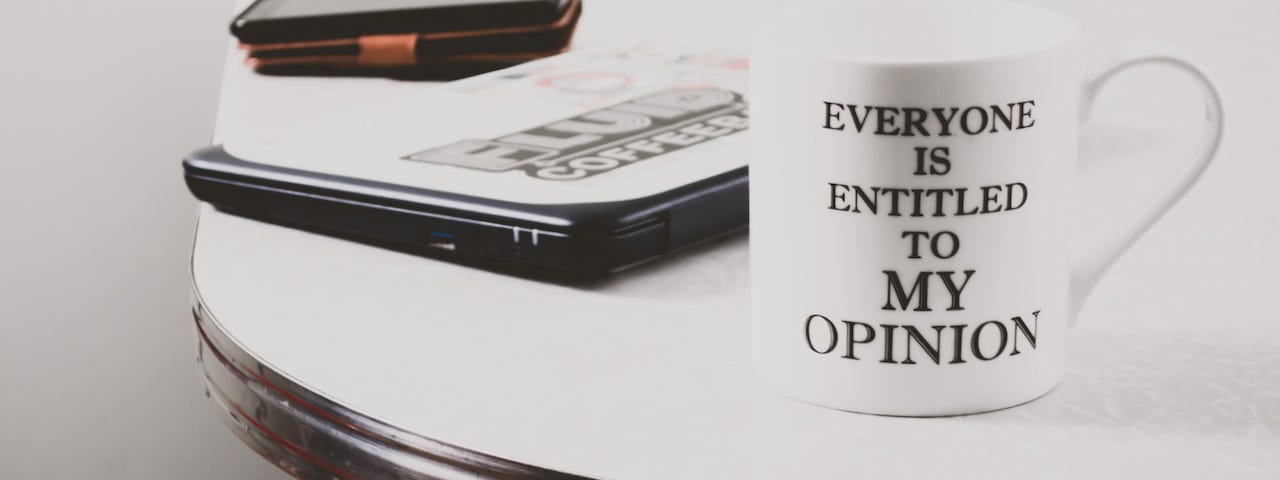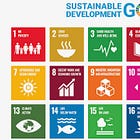WorldWise readers—
On the 14th of January 2014, I dropped by the London offices of The Guardian to attend an evening of talks on ‘how to write an opinion’ by some of the paper’s columnists and editors.
It may seem that the nicely symmetrical date is etched in my memory but it’s actually just down to fairly thorough (if slightly disorganised) record-keeping. What *is* etched in my memory though is the gist of a remark made by Natalie Hanman, now the paper’s environment editor but then editor of the Comment Is Free section.
At the time I was a few years into a job heading the op-eds section of an online outlet. I loved commissioning and editing opinion articles. It was thrilling to have the freedom to pick out views and ideas I thought were worth spreading, and being in a position to give those voices a platform. Editing was a heady mix of part word sculpture, part logical reasoning, part negotiation.
But it always puzzled me that I’d ended up in a job focused on commentary. I’d never really been an opinionated person, preferring instead to sit back and listen to all sides of a story, reserving judgment until I felt a solid one could be made.
That cold evening, soon after Hanman came on stage for her talk, she made a brief introductory comment—and I’m paraphrasing—about how great opinions, and great opinion editors, have to be really good at doing exactly that: seeing all sides of an argument and weighing the evidence behind them. Publishing a commentary is far from simply sounding off a point of view.
It all fell into place for me right then and there. Crossing over from editing to writing them then became much easier. And I still have a soft spot for crafting a good opinion.
Anita
INSIDER | views & experience
It’s personal.
That’s the first thing to bear in mind when you think about the essence of an opinion piece.
It has to be a personal viewpoint. A thought that makes a point. And for that reason you’ll find publications resistant to publishing opinion pieces by more than one person. Two authors are sometimes acceptable—more than that, and it starts becoming ‘opinion by committee’. It doesn’t really work.
It’s important to think in terms of a strong-hitting message. I’ve often worked with academics and development practitioners writing an opinion piece, so this bit of guidance was usually accompanied by a couple of explicit cautions: no jargon, and no approaching it as an objective academic analysis or report.
Having said that, a caveat: there are types of opinion columns that do have a strong analytical element. An observation or analysis piece, for example, might describe or explain what’s going on without explicitly taking a stand for or against it.
But even in those cases where the point being made is analytical, the piece might still aim to make a case or even to persuade.
So, sticking with the idea of opinion as personal view—how to go about it? Consider these dos and don’ts.
Dos
Make sure there’s one core idea—a ‘bottom line’ that everything builds up to. Even if you don’t start with it, do the work to find it. Put it down in a single sentence or a draft working headline.
Pin down your primary audience—who are you writing for: the general public, your colleagues, policymakers in your country or region? This will help define the content as well as things like tone and level of detail.
Link it up with the news agenda—journalists call this a ‘peg’, i.e. something current to hang the piece on. Or, put a different way, answer the question ‘why now?’. Look for the bigger picture around what you want to say.
Pepper it with evidence—support your argument by referencing facts, evidence, testimonies, etc. And try to stand out by adding something new, a detail not yet widely reported.
Don’ts
Avoid over-citing—this goes back to the basics of what makes an opinion work: it’s not an academic report, but an argument. Be selective about your evidence, making sure they support your point. Pick sources which are trustworthy and authoritative.
Don’t stay one-sided—your argument will be more persuasive if it considers the opposing point of view, though you don’t necessarily have to lay it out in your piece. Readers will likely have more confidence in your view if it shows balance and consideration of counter-arguments.
No jargon—this is the basic advice for any piece of writing outside the technical. Even where it’s for a specialist audience, it really does pay off to follow advice for accessible writing. Simplify your language, use the active voice, think in visuals and metaphors.
Don’t be half-hearted about it—write from a place of knowledge and experience, making an effort to turn personal insight into something universal. And believe in it! If you don’t care about what you’re saying to the reader, this will come through.
Needless to say there’s more to making opinion writing a success. The structure of a piece is key—perhaps even more important than writing prowess. That includes how the article begins and how it ends. Then there’s the whole other chapter of how to pitch and publish, which I’ll get to in a future post.
What to do next? If you’re serious about giving opinion writing a go, consider one or all of these steps.
Read and analyse other opinion writers’ work.
Get help—look for resources or 1:1 guidance.
Just make a start and try it out!
OPPORTUNITIES | working with the media
grants+funding
The RCDIJ Africa Fund is accepting applications from journalists across Africa for investigative projects in a wide range of areas, from education and health to environment, democracy, technology and more—rolling deadline. [AFRICA]
Africa No Filter’s Kekere Storytellers Fund is accepting applications for micro-grants to emerging storytellers who are already creating and publishing content that offers fresh and alternative perspectives of Africa—apply now. [AFRICA]
fellowships+scholarships
This year’s Science Journalism Forum is offering attendance fellowships to support colleagues who may face financial barriers in attending the event, which this year explores the theme of ‘Science Journalism: Seeking Best Practices’—apply now for 23-26 October. [GLOBAL]
Applications for The Open Notebook’s 2024 fellowship are open, offering a paid, part-time program for early-career science journalists—closing 31 October. [GLOBAL]
The Green Web Foundation is calling for practitioners in digital rights and climate justice who are interested in a paid part-time online fellowship of six months—closing 31 October. [GLOBAL]
The Chevening Scholarship programme is accepting applications for full or partial funding for postgraduate level study in any subject, including journalism, at any UK university—closing 7 November. [GLOBAL]
training+events
The Center for Digital Journalism at the University of Guadalajara is offering a course on data visualisation—closing 20 October. [LAC]
A new workshop from journalist Lucy Webster aims to introduce journalists to key concepts to get reporting about disability up to ethical standards—register for 23 October. [GLOBAL]
Journalists are invited to enrol in an online training, to be conducted in Spanish, which aims to explore gender perspectives in media communication, power and hate speech, strategies and best reporting practices, research methodologies, and more—register for 23 October. [LAC]
Reporters and editors with a minimum of three years’ experience are eligible to apply for a four-day training to increase their capacity to report ethically and effectively on young children and their caregivers, offered by the The Dart Center for Journalism and Trauma—closing 25 October. [GLOBAL]
Mongabay’s next webinar will explore emerging advancements in conservation technology and how journalists can better use them in their reporting—register for 26 October. [GLOBAL]
A webinar hosted by Internews' Earth Journalism Network (EJN) will discuss the consequences of the shrinking civic space on natural resource management in Lower Mekong countries—register for 26 October. [ASIA]
awards+competitions
Any Nigerian professional reporter or team of reporters who publish for a Nigerian audience is eligible to apply for this award, which this year will highlight stories on corruption, human rights violations, or the failure of regulatory agencies—closing 24 October. [AFRICA]
Professional and student journalists can enter The International Labour Organization’s Global Media Competition, which recognises fair and balanced media reports on labour migration—closing 31 October. [GLOBAL]
The True Story Award is accepting entries, in ten different languages, of stories from anywhere in the world that illuminate local events from a variety of perspectives—closing 9 November. [GLOBAL]
Journalists who incorporate social research methods in their reporting can apply for an award—closing 10 November. [GLOBAL]
audio+visual
The San Diego Arab Film Festival is inviting submissions for its Spring 2024 festival, seeking films from and about the Arab World that offer honest, realistic and non-stereotypical portrayals of the peoples of the Arab World—closing 6 November. [MENA]
pitches+positions
Rest of World is looking for a regular contributor in Bangladesh who can pitch, report sharp stories on tech and its impact on the country—apply now. [ASIA]
Erin Clare Brown, from News Lines Magazine, is looking for long-form reportage or first-person stories from reporters in North Africa and the Sahel—pitch now. [AFRICA]
Lucy Purdy from UK-based Positive News needs ideas for unique solutions-focused features—pitch now. [GLOBAL]
Internews is seeking a full-time Communications and Networking Officer in Tunisia—apply now. [MENA]
BBC Future Planet seeking pitches from female film-makers in Nepal, Brazil, and Colombia for Climate Guardians, a year-long project delving into climate solutions by women and indigenous communities in the Global South—apply now. [LAC & ASIA]
Axios is hiring an experienced copy editor to help shape, structure, and edit Axios newsletters and news stories—apply now. [GLOBAL]
The BMJ is looking for a freelance associate editor to join the research editorial team. Needs a medical degree—closing 29 October. [GLOBAL]
The New Internationalist is looking for a digital editor to develop their website and digital strategy—closing 30 October. [GLOBAL]
Mongabay has three new job positions to fill as it expands coverage of environmental and conservation news in Africa—closing 3 November or until filled. [AFRICA]
resources+tools
How to conduct open-source research online and on social platforms - GIJN
Reporting migration as a human story: tips from our journalists - Unbias The News
A Hollywood producer and a scientist talk disasters - LabX
What you need to know about using AI in the media – One World Media
Science Writers Database - The Open Notebook
VIEW | insight & global news
ICYMI—check out our latest VIEW post for a reality-check on progress towards the UN’S Sustainable Development Goals after last month’s SDG Summit, an attempt at course-correction at the halfway point towards the 2030 deadline for the goals.
PS. |
“The risks that journalists across Gaza currently face threaten their role in documenting crucial facts and shedding light on the human cost of war. According to Committee to Protect Journalists, 15 journalists, including 11 Palestinians, have lost their lives since 7 October, with more injured, missing or detained—a number that will sadly but inevitably continue to grow in the coming days and weeks.”
—Jesper Højberg, International Media Support Executive Director



